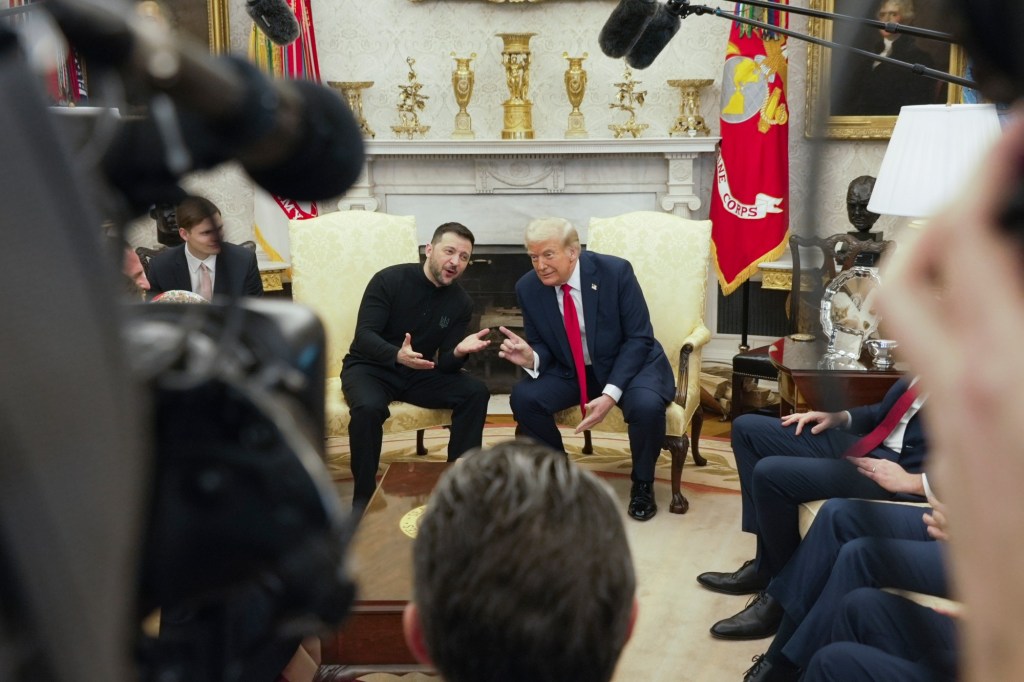
Recent weeks have provided multiple reasons to worry about how the Trump administration is approaching the war in Ukraine, now in its fourth year.
For those of us who have supported not just Ukraine, but the much larger concept of America’s role in defending democracy against autocracy, President Trump’s abrupt reorientation of American foreign policy has been disorienting at times.
To be sure, I say this as someone who has written multiple books on the threat posed by an increasingly authoritarian Russia under President Putin, and the ever-deepening ties between Moscow and Beijing.
However, whatever one thinks about President Trump or his approach to Ukraine, it is abundantly clear that Ukrainian President Volodymyr Zelensky severely misunderstood the new trajectory of American foreign policy.
Similarly, Zelensky failed to read the current mood of the American electorate.
Indeed, for the first time since the outbreak of war, more Americans support a quick end to the war (50%) than want to see U.S. support continue until Ukraine reclaims lost territory (48%), per Gallup.
Viewed from that same political lens, Trump’s approach has thus far heralded a significant change within the wider Republican Party.
Secretary of State Marco Rubio and Sen. Lindsay Graham had formerly been some of the loudest Russia hawks in the Senate, yet their condemnations of Zelensky suggest they are falling in line behind the president.
Zelensky – or his advisors – should have been aware of this shift in sentiment and adjusted their approach, but they did not.
Not only was this evident during the disastrous Oval Office meeting between the two leaders, but in the days that followed.
It was not until Tuesday, right before Trump’s address to a joint session of Congress, when Zelensky realized he needed to clearly thank the administration, sign the proposed mineral deal, and recommit to ending the fighting.
Put another way, with Ukraine significantly dependent on American military aid and intelligence sharing, Zelensky should have recognized the need to play along with the administration.
This includes giving up calls for American boots on the ground and understanding that a mineral deal which drastically increased American investment in Ukraine would serve as a bulwark against Putin.
In order to keep the – very – transactional Trump on board and in pursuit of a peace deal, Zelensky should have seen the need to give him something in return, notwithstanding Ukraine’s understandable skepticism towards the effectiveness of a ceasefire deal.
To be absolutely clear, this is not to say Trump and Vice President J.D. Vance are totally blameless.
An argument could be made that thus far, in his – justified – pursuit of a peace deal, Trump has placed more pressure on Zelensky rather than Putin, who began this war.
Far from being my opinion, the data backs this up.
A majority (52%) of Americans support Ukraine compared to just 4% backing Russia, yet a plurality (46%) of Americans believe that Trump’s actions thus far actually favor Russia, per CBS polling.
In that same vein, Trump and Vance’s approach to our European allies is markedly out of step with how the American public feels.
Whereas Trump and Vance have often berated European leaders, Americans are nearly unanimous (96%) in their belief that Western European countries are our allies or friends, according to the same CBS poll.
Conversely, roughly two-thirds (66%) of Americans believe Russia is either unfriendly towards the U.S. (32%) or is an outright enemy (34%).
At the same time, two-thirds of Americans believe the U.S. needs to work with our allies to advance our foreign policy, while less than one-fifth (17%) prefer the isolationist world view Trump is espousing.
Politically, this suggests that while an “America First” foreign policy is what voters want, it is not at all clear that an “America Only” policy which sees the U.S. abandon its role on the world stage has the same support.
That being said, to Trump’s credit, he is entirely correct when he points out that part of the reason Ukraine is so dependent on American support is because of the ineffectiveness of Europe thus far.
For too long, Europe has outsourced its defense to the U.S. and refused to take necessary steps to stand on its own two feet. The bloc’s recent announcement of a massive increase in military spending is a good start, but it is years too late.
Nevertheless, there was never any reason the U.S. – Ukraine relationship should have deteriorated to the point where its president is publicly arguing with the American President, in the Oval Office.
Ultimately, Trump’s transactional approach leaves the door open for Zelensky to reverse course.
To do so, he must recognize that going along with a mineral deal and giving Trump the return on American investment he wants isn’t merely political expediency – it’s a strategic necessity.
Ukraine’s survival, in large part, depends on American support.
But Zelensky cannot maintain that support unless he approaches negotiations accepting today’s political reality in which the American public – and the Trump administration – want a settlement that ends the fighting, even if the deal is short of what Zelensky considers perfect.
As such, the next step must be returning to talks in pursuit of a deal that enshrines recognizable Ukrainian borders and provides security guarantees, backed by the U.S. and Europe, but without American troops.
This is the only way to avoid a repeat of Russia’s invasion once Putin has had time to rearm.
Douglas Schoen is a longtime Democratic political consultant.



